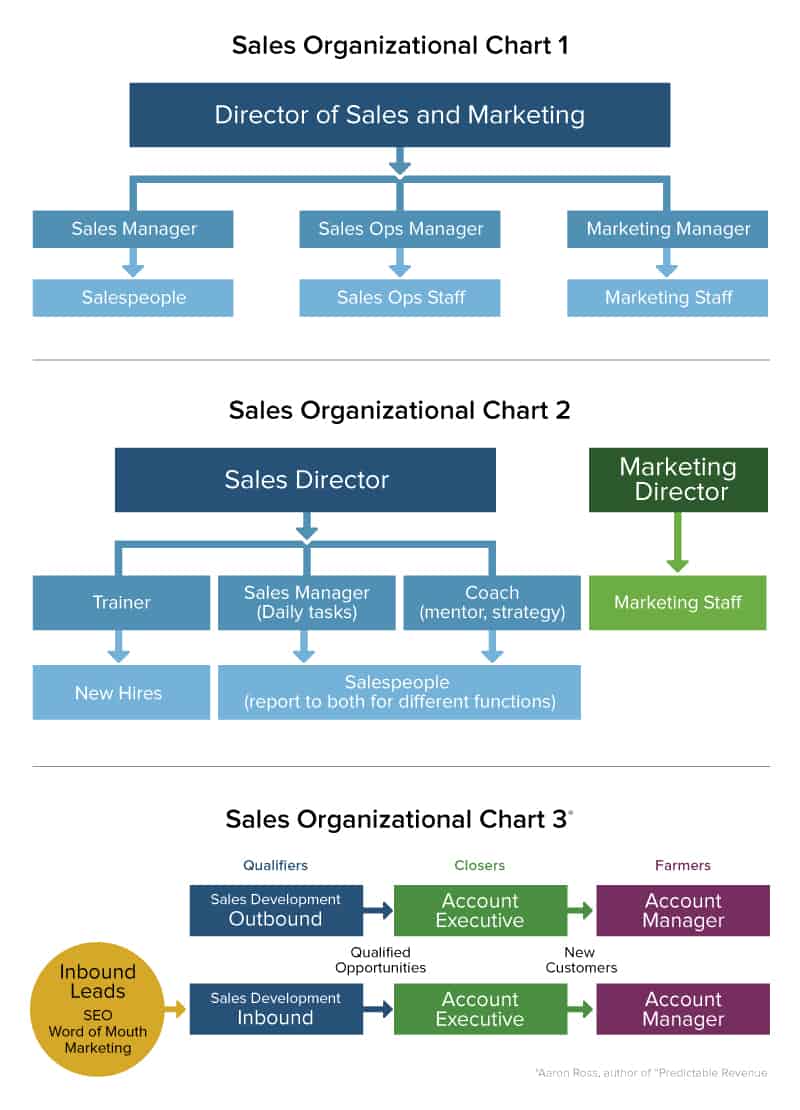Sales Operations Roles and Functions
Sales operations roles and functions have evolved since their introduction in the 1970s. Neil Rackham, author of Spin Selling, writes that he first came upon the concept at Xerox, when a new group was created to manage sales planning, compensation, forecasting, and territory design. Group leader J. Patrick Kelly described their duties as “all the nasty number things that you don’t want to do but need to do to make a great sales force,” according to Rackham, in his foreword to The Power of Sales Analytics, by Andris A. Zoltners, Prabhakant Sinha, and Sally E. Lorimer for ZS Associates.
Today, the broader purpose of sales ops is to enhance sales effectiveness and productivity. To do that, sales ops smooths out processes, makes better use of numbers and research, gives sales reps what they need to make pitches, and performs a variety of other functions. Here’s a look at common sales operations roles and responsibilities. This lists starts with tactical duties and progresses to increasingly strategic roles:
- Managing sales data
- Reporting sales and campaign results
- Communicating news and wins
- Organizing and maintaining sales collateral for access by reps
- Sales forecasting for goal setting, using past data and indicators
- Managing sales representative compensation plans and incentives
- Defining sales territories
- Managing technical tools and platforms, including CRMs (customer relationship management platforms such as Salesforce), often in collaboration with IT
- Handling lead generation and booking appointments
- Training staff in products, market, and processes for sales excellence
- Developing “go to market” models for products and campaigns
- Increasing reps' efficiency with leads, transactions, and time management
- Hiring and onboarding employees and mentoring current ones
- Defining and refining structured sales processes for efficiency
- Defining sales process steps to improve conversions, shorten sales cycles, and maximize wins
- Playing a key role in sales and operations planning (S&OP), a process where executives continuously align diverse functions in an organization
- Interpreting analytics and research for the company’s understanding
- Using internal data, along with market and competitor research, to help drive sales strategy and “hit the numbers”
- Using “big data,” complex data sets requiring sophisticated analysis, for advanced interpretation and predictive analytics to drive strategy and actions
- Having a sales ops leader serve as a “chief of staff” to the revenue/sales leader
- Having a sales ops department as a “center of excellence,” operating at the forefront of strategic leadership and decision making
Sales Enablement vs. Sales Ops: The Overlap
In the past few years, some companies have created adjunct sales enablement teams to support sales ops teams. The overall purpose of both teams is the same: to increase sales effectiveness and productivity and increase profits. Given this overlap, it’s vital for the teams to be clear on their respective responsibilities and their need to collaborate. Organizations are defining the respective responsibilities differently, so confusion is understandable.
The official definition of sales enablement comes from Forrester Research, which conducted a study: “A strategic, ongoing process that equips all client-facing employees with the ability to consistently and systematically have a valuable conversation with the right set of customer stakeholders at each stage of the customer’s problem-solving life cycle to optimize the return of investment of the selling system.”
So, the sales enablement team often works more directly with the salespeople, and is more involved in the early stages of developing a sale. The sales operations team often comes in at the negotiation and closing phases. The following examples show a common division of responsibilities:
Sales Enablement
- Training the sales staff in processes and products
- Smoothing the sales processes
- Reporting sales performance data
- Communicating with the sales staff
- Helping to engage customers with tools and analysis
Sales Operations
- Planning sales territories and assigning accounts
- Managing proposals and contracts
- Sales compensation and incentives
- Sales forecasting and reporting
- Managing data and systems such as the CRM
How Marketing Works with Sales and Sales Operations
Marketing departments are typically responsible for promoting the brand, products, services, and individual campaigns. They usually have creative teams that develop the messaging and ad presentations in various media including TV, radio, digital, email, print, direct mail, and billboards. Salespeople or sales ops communicate with potential buyers to do the actual selling, and sales ops people (and/or sales enablement people) organize and support those sales people to give them optimal time in front of customers.
So while marketing and sales operations have different functions, they both often work in the same areas of customer data and research, technical tools, planning, and processes, and also help to drive sales, revenue, and the overall business. It’s vital that they align their tasks to avoid duplication and cross-purpose work, but given the silos that form in many workplaces, lack of alignment is a common problem. It’s also challenging to keep up with changing buyer behavior, so consistent alignment of marketing and sales ops is an integral part of sales and revenue success. One way marketing does this is through marketing automation with platforms (such as Hubspot) that track and communicate with customers. These platforms frequently tie in with CRMs that are often managed by sales ops people. So again, aligning these efforts is essential to boost a company’s efficiency and effectiveness.
Because sales operations teams are involved in such diverse functions involving numbers, process, and technology, they can also serve as liaisons with other departments, such as IT, production, finance, and legal.
Common Questions Related to Sales Ops
Terminology is a common point of confusion. Here are answers to frequently asked questions regarding sales operations language.
- What is sales support? Duties that support the actual selling by sales people. It can be a general term meaning sales ops or enablement, or a specific term delineating functions within sales ops, sales enablement, or even marketing. Sales support, sales support associate, and sales support coordinator are common job titles.
- What is a sales operations analyst? A sales ops member who analyzes data, research, and/or processes. Duties may include handling sales data and reports, compensation and incentive plans, sales processes, and customer and marketing data.
- What is the concept of marketing operations? This usually covers marketing automation platforms, lead generation/management and contract handling, as well as any tech or data marketing functions.
- What is business operations? This typically refers to any of the day-to-day functions and tasks that keep a business running and earning money.
- What is a CRM? A platform or tool to handle customer relationship management. A common CRM is Salesforce, which monitors and measures customer interactions with the business to ensure good customer service and increased revenues and profits.
What the Pros Say: Common Issues and Headaches
Here’s what several experts say about the most common issues and challenges in sales and sales operations:
“The biggest issue I see with sales operations is a disconnect between the organization’s strategy and the metrics driving sales. A close look at any organization’s (or function like sales operations’) metrics/measures will inform what behaviors the organization will see most frequently. If the top metric, for which people are measured against, is number of sales, you’ll see a lot of sales, regardless of their quality or profitability. Unlike other functions in organizations, sales operations is often closely tied to revenue, so they usually get a long leash at the expense of the organization’s strategy or other functional efforts - think marketing and sales operations conflicts. These problems can be remedied by having clear strategic priorities and ensuring that all functions in the organization cascade metrics that clearly align with these strategic priorities and other functions.”
“First off, most small- to medium-sized business owners are experts in a field that is not sales, and yet they try to manage their sales staff on their own. … Secondly, many businesses do not focus on implementing a proven and repeatable sales process. There are best practices in every industry, and they can be incorporated into a sales process that qualifies and sells the customer at the same time.”
“There are so many issues with the current widespread sales ops structure. Companies have the wrong people in the wrong places. I could go on for hours about it, but to give you a quick example of how flawed the current system is: A sales person does well. Promote them to sales manager. But that takes them out of the field where they are able to sell. Would you take your best basketball player out and make him coach and no longer play? Same theory with current structures. Most good salespeople are not methodical number crunchers and are not good with their CRM and paperwork. But the sales manager job is all that.”
The two biggest problems he sees in his work are sales forecasting and data demands. A decade ago forecasting was pretty much back of the napkin. While it’s still subjective with some loosey goosey numbers, he explains that the forecasting systems have become a bit more rigorous in recent years. The demand for more and more data is the second big problem for sales ops. “Just the data alone is putting huge pressure on the sales operations team,” he says. “They’re wearing too many hats.”
“I've seen various issues arise consistently - none more insidious than being unable to get your sales team to adopt your CRM system. Most modern sales processes, from Predictable Revenue to Sandler to Dale Carnegie, are based on being data smart - able to collect and analyze data in ways that help you tweak your efforts for maximum effectiveness. Yet if you can't get your salespeople to use your CRM system consistently, it creates havoc for the entire process - incorrect results, inability to get answers to some questions, and sometimes even misreading markets.”
Quality hiring is a big problem. “There must be an in-depth process to determine the best fit for the job profile,” Smith advises. “You need to have a complete description of the skill set.” Other problems include accountability, lack of training, and upgrading the team to eliminate poor sales performers. “The operations people need to support these four things,” Smith adds. After the economic downturn in 2008, many companies cut back on sales and sales support. “The gap is that salespeople now aren’t getting quality training,” he explains.
Other Common Sales Ops Headaches
Various internal and external factors can create problems with sales operations. Here are common ones that crop up.
- Constantly changing business and technology climates can be hard to keep up with without focus and clarity of mission and roles.
- An unclear or evolving mission and objective(s) can cause confusion in sales ops functions and roles. If executives and managers aren’t clear, no one else can be either.
- The addition of new functions, roles, and teams can overlap, which necessitates consistent realignment of roles and responsibilities.
- The interplay of sales, sales operations, sales enablement, and marketing requires constant attention to maintain efficiency and division of function.
- Unclear steps in the sales process, or a lack of any structured sales process, makes it difficult to optimize sales and have a well-functioning sales or sales ops staff.
- Finding sales ops people who can perform both strategy and operations functions can be a challenge.
- Alignment difficulties multiply when teams are spread out geographically, such as in a national or global company.
- Aging technology, such as an outdated CRM and lead management, can hold back success.
- Lack of proper technology and expertise with advanced data can also hold back success.
- In tough economic times, executives may view sales ops as a “cost center” and make cutbacks, which leads to less effective salespeople and further decreased sales.
Pro Tips for Improving Sales Ops Team
We asked the pros for their thoughts on how to improve sales operations. A common theme: It’s essential to keep on top of things. Below are their top recommendations:
D. Kevin Berchelmann: “Quit being so stingy with resources for the sales operations side.”
Elisabeth Marino: “A sales organization needs constant fine-tuning as their immediate market changes with new competitors, new economic conditions, new players in the target market, changes in the technology of the industry, and so much more. That's where a seasoned expert with a proven plan and strong coaching skills comes in and greases the rails for the sales team. It's about helping the team avoid spending their precious time and energy ineffectively. Sales reps keep their eye on the prospects. Good sales directors keep their eye on the market. … One of the keys to sales ops is making sure that sales is aligned with a coordinated marketing effort, and that both are based in solid, current market research.”
Ali Mirza: “There needs to be more sales trainers and sales coaches in organizations and the right people in those roles.”
In summary, in order to remedy sales ops problems, companies and department leaders should:
- Be crystal-clear on the mission and objectives - and consistently communicate them - so that all oars are rowing in the same direction.
- Have a consistent process for reviewing functions and roles to ensure optimal alignment. Be sure to address role conflicts immediately, and keep everyone tied to the mission and goals.
- Consider rotating people between sales, sales ops, sales enablement, and perhaps marketing to maintain flexibility and clarity.
- Make sure to give sales ops teams an equal seat at the table, especially as they take on more strategic functions. This includes a high-level sales ops manager or director.
- Go where the data leads you. Be willing to challenge old ways of doing things when the evidence is there, and be willing to experiment, too.
- Listen to customers through direct communication, statistics, and research. Constantly adapt to changing conditions.
Startup Strategy for Sales Operations
In startup companies, the CEO is often the only one selling, at least initially. So much depends on your funding, says Mike Hayes, VP of Customer Engagement at Koru. At first, the most important issue is organizing contacts into a database so you can build processes around them. LinkedIn can serve as a good initial resource to start finding leads. In this early stage, CEO or other sellers perform the sales ops functions. More resources can come with more funding.
“The first thing I would add in are the people who can do lead generation for you,” Hayes says. It’s important to develop a good “cadence of communication,’’ or touch points with prospects or customers, and get more booked sales appointments. He says it can be effective to have two lead generation people who compete. Building off of LinkedIn, Hayes suggests that startups use sales intelligence resources such as discover.org and Avention.
Hayes adds that, “For funding, people want to see you moving away from the CEO selling.” So, once you’ve moved beyond the CEO selling, the company can start focusing more on the contract process, capturing inbound leads from the website, handling outbound leads, and other functions.
“Learn where the sweet spot is in the market,” Hayes says. “Pile into that area and amplify the results.”
An Average Sales Ops Team vs. An Excellent One
Basic tasks play an essential role in the operation of any company, but some tasks present an opportunity to go a step further and increase value. Here are three quick examples of a task handled by an average sales ops team vs. an excellent, more strategic one.
- An average team accurately reports the sales numbers. An excellent one interprets the numbers and recommends possible actions.
- An average team competently manages the CRM and leads. An excellent one consistently looks for ways to improve the CRM and lead process to improve sales productivity.
- An average team reports data and explains a likely reason for a recent campaign’s poor performance. An excellent one notes the problem partway through the live campaign, adjusts course, and improves the results.
How Smartsheet for Salesforce Can Help with Sales Ops
Empower your people to go above and beyond with a flexible platform designed to match the needs of your team — and adapt as those needs change.
The Smartsheet platform makes it easy to plan, capture, manage, and report on work from anywhere, helping your team be more effective and get more done. Report on key metrics and get real-time visibility into work as it happens with roll-up reports, dashboards, and automated workflows built to keep your team connected and informed.
When teams have clarity into the work getting done, there’s no telling how much more they can accomplish in the same amount of time. Try Smartsheet for free, today.









